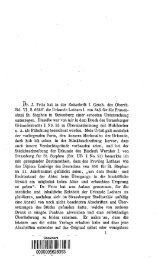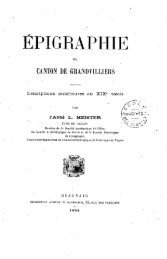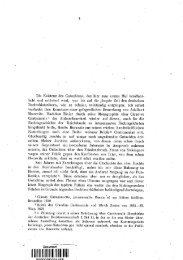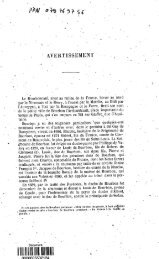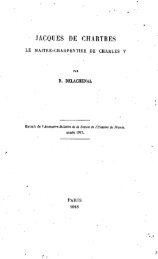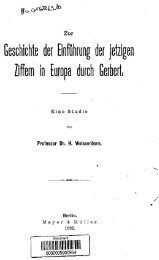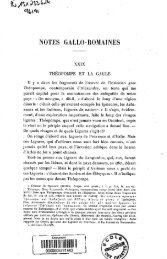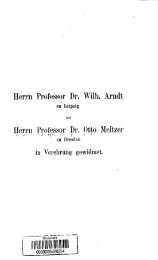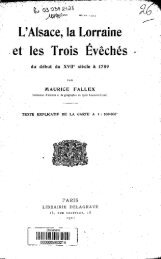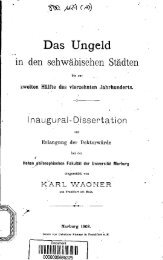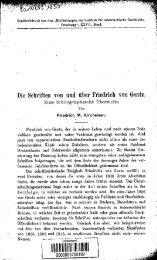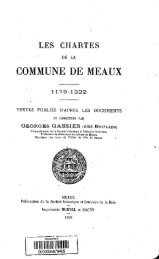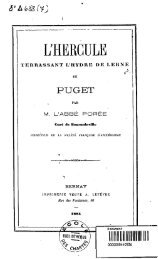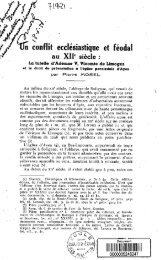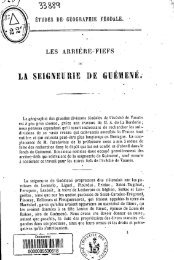4P Li gç(' TRANSACTIONS
4P Li gç(' TRANSACTIONS
4P Li gç(' TRANSACTIONS
Create successful ePaper yourself
Turn your PDF publications into a flip-book with our unique Google optimized e-Paper software.
VOL. 47, PT. S,1957] ORESME'S VERSION AND ENGLISH TRANSLATION 835<br />
et sunt permanens pour leur paternes et parens. Car<br />
anciennenient it faisoient tres solennciies exeques et sacrelices<br />
pour leur parens, Si COmflle it appert par Ics hystoires.<br />
Et met Virgule ou quint de Eneyde commc Eneas celebra<br />
solennelment l'annuel de son pere: Anrius exactis cornpietur<br />
mensibus orbis ex quo reiiqui;ts divinique ossa<br />
parentis condidimus terra, et cetera. EL apres est comme<br />
it promist a faire de cc remembrance chescun an: Jamque<br />
dies nisi fallor adest quem scrnper acerbum, semper honoratuni<br />
sic dii voluistis haheho. Et a ceste exposition<br />
s'acorde une autre lecture, qui en lieu de orationes palernorum<br />
met orationes puerorum. Et ccci est grande reproce<br />
a nous qui avons vraie creance Se nous tie prions pour nos<br />
predecesseurs: Sancta ergo et salubris est cogitacio pro<br />
defunctis exorare. Et donques chescun doit moult curer<br />
de avoir bonne lignie qui de cc face son devoir. Et par<br />
consequent, que sa femme soit bonne. Mes scion une<br />
autre exposition, par ces moz oraciones paternorum sunt<br />
a entendre les oroysons que les parens charneiz et les<br />
prestres qui sunt parens esperituelz faisoient pour le<br />
homme et pour la femnie quant it assembioient par manage,<br />
afin qu'ii eussent bonne lignie, aussi comme maintenant<br />
l'en ics benoist et / (343b) mesmement lit femme et fait<br />
l'en oroysons. Et CC qui sensuit s'acorde a une exposition<br />
et a l'autre.<br />
T. Et nionqucs ceuiz qui ces choscs contempnent ou<br />
qui les out en despit et n'en tiennent compte, ii semble<br />
qu'ii ne curent des diex.<br />
G. Ne de oroisons divines. Et comme autrefois est dit,<br />
Aristote tie niettoit quun seul dieu; mas it pane selon Ic<br />
comniun peuple, qui niettoient pluseurs diex. Apres it<br />
met la sixtu raison.<br />
T. Item, et pour Ins (hex (levant lesquclz le man<br />
sacriha et occist sacrifices et cspousa sa femme et se<br />
bailia a cite a honeur moult plus qtie a autre apres ses<br />
parens.<br />
G. Car en ccl temps len solenmizoit le nianiage es<br />
temples devant les ydoles et Ic mari offroit et sacrifloit<br />
et tuoit aucune beste et juroit et proniettoit quil feroit et<br />
garderoit honcur a sa femme. Et encor niaintenaflt, en<br />
cest pals, dit Ic homme a la femme quant it l'espousc: Et<br />
de cest aneau te honncure, 1 etc. Et senible que teies choses<br />
qui ont esté reputees bonnes et tenues teles ou semblables<br />
en toutes lays et en tous temps sojent aussi comme lays<br />
natureles. Or avons donques que Ic man doit honeur a<br />
sa femme et nut tie est a honorer se it tie est hon. Et<br />
donques doit it faire a son povoir que sa femme soit bonne.<br />
4. Ou quart chapitre ii moustre par queues lays et<br />
coinme le inari doit faire que sa Jemnie soit bonne.<br />
T. A sobre femme tres grant honeur est se elle voit<br />
que son mari Iui garde chaste.<br />
G. Car it est tenu a cc comme dit est et iui fait en cc<br />
tres grant honeur.<br />
ciren as long as they live and these are continuous for their<br />
ancestors and parents. Formerly in ancient times, the<br />
children performed solenin funeral rites and sacrifices for<br />
their parents, as is recorded in the histories. And Vergil<br />
relates in Aencid V 46-7 1, how Aeneas celebrated solemnly<br />
the annual date of his father's death: 'An annual circle of<br />
twelve full months has been completed since we laid in the<br />
earth the ashes and bones of my fattier, etc." And there<br />
follows the promise lie made to rellieliut)Cn this occasion<br />
each year: "And now, if I mistake not, the day draws nigh<br />
that I shall forever (so, 0 gods, you have willed it) deem<br />
both sacred and sad' [Aeneid V, 49-501. And a different<br />
reading, in which we find prayers of the children instead<br />
of prayers of the ancestors, supports this interpretation.<br />
And we deserve to be reproached if, although we possess<br />
the true faith, we do not pray for our predecessors: "It is<br />
a holy and pious thought to pray for the dead" [II Mace.<br />
12: 46]. Therefore, everyone must try to have good<br />
progeny who will perform these rites dutifully. And it<br />
follows that one's wife must be a good woman. But according<br />
to another interpretation, the words prayers of the<br />
ancestors refer to the prayers offered by time parents and<br />
the priests for the husband and wife when they are united<br />
in marriage, in order that they may have good offspring;<br />
just as at present husband and wife are blessed, / (343b)<br />
especially the wife, and prayers are offered. And the<br />
following passage admits of either one of these interpretations.<br />
T. And thus those who treat these things lightly,<br />
disdainfully, or pay no attention to them would seem to<br />
treat the gods slightingly.<br />
G. And divine prayer likewise. And as we have said<br />
before, Aristotle held that there is only one god, but lie<br />
speaks here the language of the common people, who<br />
assumed there were several gods. Next he presents the<br />
sixth argument.<br />
T. Therefore, for the sake of the gods in whose<br />
presence the husband has offered sacrifice and has married<br />
his wife and has promised to honor her above all<br />
others save only his parents [a man must care for his<br />
wife and children. (Sentence incomplete in Latin<br />
original.)].<br />
C. For at that time marriage was solemnized in temples<br />
in the presence of idols and the husband gave an offering<br />
and sacrificed an animal lie had killed and then lie swore<br />
and promised to keep and protect the honor of his wife.<br />
And in this country even today, the man says to the woman<br />
when he marries her: "And I honor you with this ring,<br />
etc." And it would seem that acts of this nature which<br />
have been considered good and held to be fitting and proper<br />
in all times and under all customs are like natural laws.<br />
Thus we assume that the husband should honor his wife<br />
and no one deserves honor if he is not good. Therefore,<br />
the husband must do everything possible so that his wife<br />
may be good.<br />
4. In the fourth chapter he shows how and by what<br />
rules the husband should act so that his wife may be<br />
good.<br />
T. A modest wife is greatly honored if she sees that<br />
her husband is faithful to her.<br />
C. For he is obligated to act thus as indicated above<br />
and in so doing lie pays her great honor.



